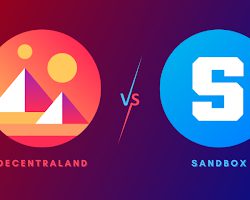Top 10 Metaverse Platforms Embracing NFT Technology

The concept of the metaverse refers to a virtual universe or a collective virtual shared space where people can interact with a computer-generated environment and other users in real-time. The term “Metaverse platforms” has gained significant attention and popularity in recent years, and it has become a topic of discussion within the NFT technology and gaming industries, as well as among futurists and enthusiasts.
The metaverse can be thought of as an evolution of the internet, moving beyond static web pages and two-dimensional social media platforms to a more immersive and interactive digital realm. It represents a convergence of various technologies, including virtual reality (VR), augmented reality (AR), artificial intelligence (AI), blockchain, and other emerging technologies.
In the metaverse, users can create digital avatars that represent themselves and navigate through a vast, persistent, and interconnected virtual world. They can interact with other users, explore different environments, engage in various activities, and even conduct business transactions. The metaverse aims to provide a seamless and immersive experience, blurring the line between the physical and digital realms.
One of the essential aspects of the metaverse is its scalability and openness. It should be accessible to anyone with an internet connection, allowing users from all over the world to participate and contribute. Additionally, the metaverse should be interoperable, enabling users to move seamlessly between different platforms, applications, and virtual spaces.
The metaverse holds immense potential across multiple domains. It can revolutionize the way we work, learn, communicate, and entertain ourselves. For example, in the realm of work, the metaverse could offer virtual offices where remote teams can collaborate, conduct meetings, and share resources in a more immersive and engaging manner. It could also provide new avenues for education, allowing students to explore virtual classrooms, interactive simulations, and experiential learning environments.
In terms of entertainment and gaming, the metaverse can offer a rich and dynamic experience. It can serve as a platform for socializing, hosting virtual events, concerts, and conferences. Moreover, it can provide opportunities for creative expression and user-generated content, allowing individuals to build and customize their virtual spaces, design and sell virtual assets, and even create their own games or experiences.
The concept of the metaverse is not without its challenges. Technical hurdles, such as creating realistic virtual environments, ensuring smooth interactions, and handling vast amounts of data and computations, need to be overcome. Additionally, there are concerns related to privacy, security, and the ethical use of AI within the metaverse.
Several companies and projects have already started exploring and building elements of the metaverse. They range from social VR platforms and virtual worlds like VRChat and Second Life to gaming platforms like Roblox and Fortnite. Major technology companies and tech pioneers have also shown interest in the metaverse, envisioning it as the next frontier of the internet.
It is important to note that the metaverse is still a developing concept, and its full realization may take time. However, as technology continues to advance and more innovations emerge, the metaverse has the potential to reshape how we interact with digital content, connect with others, and experience the virtual world.
Relation Between Metaverse platforms and NFT Technology
The relation between the metaverse platforms and NFT technology is significant and intertwined. NFTs have gained prominence as a means of representing ownership and authenticity of digital assets within the metaverse.
NFTs are unique digital tokens that are built on blockchain technology, typically utilizing Ethereum’s blockchain. Unlike cryptocurrencies like Bitcoin or Ethereum, which are fungible and interchangeable, NFTs represent one-of-a-kind items or assets. They can be used to tokenize various digital objects such as artwork, virtual real estate, virtual fashion items, collectibles, and more.
In the context of the metaverse, NFTs play a crucial role in establishing ownership and provenance of virtual assets. They enable users to buy, sell, and trade digital items, creations, and experiences in a secure and transparent manner. For example, within a virtual world or game, NFTs can represent unique virtual real estate properties, virtual goods like clothing or accessories for avatars, or even virtual art pieces.
NFTs provide several benefits within the metaverse ecosystem:
1. Authenticity and Scarcity: NFTs establish the authenticity and uniqueness of digital assets. They prove ownership and ensure that a particular item or artwork is the original version. This scarcity and provenance make digital assets more valuable and desirable.
2. Ownership and Control: NFTs grant users true ownership and control over their digital assets. Unlike traditional digital assets that can be easily copied, NFTs use blockchain technology to record ownership history and enable secure transfers. Users can buy, sell, or trade NFTs with confidence, knowing that they have the rightful ownership of the underlying asset.
3. Interoperability: NFTs can be designed to be interoperable, meaning they can be used across different platforms and virtual worlds. This allows users to transfer their virtual assets seamlessly between different metaverse environments, increasing their utility and value.
4. Monetization and Creator Economy: NFTs provide new avenues for creators and artists to monetize their digital creations within the metaverse. Artists can sell their artwork directly to collectors as NFTs, retaining more control over their work and potentially earning royalties whenever their NFTs are resold in the future.
5. Gamification and Engagement: NFTs can enhance the gaming experience within the metaverse. Players can collect rare and valuable in-game items or characters as NFTs, providing a sense of achievement and investment in the game. NFTs can also enable cross-game compatibility, allowing users to transfer their virtual assets between different games or platforms.
The metaverse and NFT technology are mutually reinforcing each other’s growth. The metaverse provides a dynamic and immersive environment for NFTs to exist and thrive, while NFTs enhance the metaverse by introducing digital ownership and a marketplace for unique digital assets. As the metaverse expands and evolves, it is expected that NFTs will play an increasingly important role in shaping the economy, culture, and experiences within this virtual universe.
Kondux will disrupt the NFT space with its unique technology that brings 2D NFTs to life
The $kndx token will offer exclusive access to Kondux platform technology, whitelists, gaming power-ups and NFTs.
In other words, stack up on $kndx$wrld $mana $sand #NFT #Metaverse $ufo pic.twitter.com/fnUgq9IWtV
— Shaun Bean👽👽 (@SeanHasBean) March 27, 2022
Also read: Here Are The Top 10 Metaverse Platforms In 2022
Top 10 Metaverse Platforms Embracing NFT Technology
The metaverse is a rapidly growing space, and NFTs are playing an increasingly important role. Here are the top 10 metaverse platforms that are embracing NFT technology:
- Decentraland
Decentraland is a virtual world that is owned and operated by its users. Users can buy land, build structures, and create experiences in Decentraland. NFTs are used to represent land, wearables, and other assets in Decentraland. 
- The Sandbox
The Sandbox is another popular metaverse platform that uses NFTs. In The Sandbox, users can create, build, and monetize their own NFTs. The platform has partnered with a number of major brands, including Atari, The Walking Dead, and Shaun the Sheep.
- Axie Infinity
Axie Infinity is a blockchain-based game that uses NFTs to represent creatures called Axies. Axies can be bred, trained, and used to battle other Axies. The game has become incredibly popular in Southeast Asia, where it has been used as a way to earn income. 
- Roblox
Roblox is a popular online game platform that allows users to create their own games. NFTs are starting to be used in Roblox, and there are a number of games that allow users to own and trade NFTs.
- Sorare
Sorare is a fantasy football game that uses NFTs to represent players. Users can collect, trade, and manage their own teams of NFT players. The game has become very popular, and it has raised over $600 million in funding. 
- Blankos Block Party
Blankos Block Party is a multiplayer game that allows users to create and customize their own characters. The game uses NFTs to represent characters, clothing, and other items. Blankos Block Party is still in development, but it has already attracted a large following.
- Earth 2
Earth 2 is a virtual world that is a 1:1 replica of the Earth. Users can buy land in Earth 2, and they can use the land to build structures, grow crops, or mine resources. Earth 2 is still in development, but it has the potential to be a very large and immersive metaverse. 
- Cryptovoxels
Cryptovoxels is a 3D voxel-based metaverse that uses NFTs to represent land, buildings, and other assets. Users can create their own experiences in Cryptovoxels, and they can also interact with other users.
- Upland
Upland is a metaverse that is based on the real world. Users can buy and sell virtual properties that are mapped to real-world locations. Upland has been used to raise money for charity, and it has also been used to educate people about the real estate market. 
- ** Somnium Space**
Somnium Space is a high-end metaverse that is powered by VR. Users can explore Somnium Space using a VR headset, and they can interact with other users in real time. Somnium Space has been used to host concerts, art exhibitions, and other events.
These are just a few of the many metaverse platforms that are embracing NFT technology. As the metaverse continues to grow, we can expect to see even more NFT-based platforms emerge.
Benefits of Metaverse Platforms for NFT
Metaverse platforms offer numerous benefits for NFTs (Non-Fungible Tokens) and contribute to the growth and development of the NFT ecosystem. Here are some key advantages of metaverse platforms for NFTs:
1. Expanded Audience and User Base: Metaverse platforms attract a large and diverse user base, including gamers, artists, creators, and enthusiasts. By integrating NFTs into these platforms, NFT creators can tap into this expanded audience and gain exposure to potential buyers and collectors who are already active within the metaverse.
2. Enhanced Visibility and Discoverability: Metaverse platforms provide dedicated spaces and marketplaces for NFTs, making it easier for users to discover and explore various digital assets. These platforms often feature curated collections, rankings, and search functionalities that help users navigate through the vast NFT offerings, increasing the visibility of NFT creators and their works.
3. Seamless Transactions and Ownership: Metaverse platforms offer integrated wallets and marketplaces that facilitate smooth and secure transactions of NFTs. Users can easily buy, sell, and trade NFTs within the platform environment, eliminating the need for external exchanges or complex procedures. Additionally, blockchain technology ensures transparent ownership records, making it easier to verify the authenticity and provenance of NFTs.
4. Enhanced Interactivity and Engagement: Metaverse platforms provide interactive and immersive environments where users can engage with NFTs in unique ways. For example, users can showcase their NFT collections in virtual galleries, display virtual fashion items on their avatars, or use NFTs as in-game assets. These interactive features enhance the overall user experience and increase the engagement and value of NFTs.
5. Cross-Platform Compatibility: Many metaverse platforms are designed to be interoperable, allowing users to transfer their NFTs across different platforms and virtual worlds. This cross-platform compatibility enables NFT owners to extend the utility of their assets beyond a single platform, broadening their reach and potential audience.
6. Monetization Opportunities: Metaverse platforms offer various monetization avenues for NFT creators. Users can sell their NFTs directly on the platform’s marketplace, participate in auctions or bidding, and even earn royalties on secondary sales of their NFTs. These monetization opportunities incentivize creators and artists to produce high-quality NFTs and contribute to the growth of the NFT ecosystem.
7. Community and Social Interaction: Metaverse platforms foster vibrant communities and social interactions among users. By integrating NFTs into these platforms, creators and collectors can connect, collaborate, and engage with like-minded individuals who share similar interests in art, gaming, or other NFT categories. This sense of community enhances the overall experience of owning and trading NFTs.
8. Longevity and Persistence: Metaverse platforms offer persistent virtual worlds, meaning that the environment and assets within the platform persist over time. Unlike traditional online games or applications that may shut down or undergo major changes, metaverse platforms provide a stable and long-term infrastructure for NFTs. This longevity ensures the continued availability and accessibility of NFTs, making them a reliable investment for collectors.
Overall, metaverse platforms provide a robust ecosystem for NFTs, offering benefits such as expanded audience reach, enhanced visibility, seamless transactions, interactivity, monetization opportunities, and community engagement. As the metaverse continues to evolve and gain traction, these advantages will further propel the growth and adoption of NFTs, creating new opportunities for creators and collectors alike.
Also read: Top 10 Ways NFT Gaming Is Affected By Metaverse Development
Future of Metaverse platforms and NFT technology
The future of metaverse platforms and NFT technology holds tremendous potential for transforming various industries and reshaping how we interact with digital content. Here are some key aspects that illustrate the exciting possibilities ahead:
1. Mainstream Adoption: Metaverse platforms and NFT technology are likely to see increased mainstream adoption in the coming years. As technology advances, these platforms will become more accessible, user-friendly, and compatible with a wide range of devices. This accessibility will attract a larger user base, including individuals who may not have been early adopters of virtual reality or blockchain technology.
2. Convergence of Technologies: The future of metaverse platforms will witness the convergence of various technologies, including virtual reality (VR), augmented reality (AR), artificial intelligence (AI), blockchain, and more. This convergence will result in more immersive and interactive experiences, where users can seamlessly transition between physical and virtual realms. AI will play a significant role in creating dynamic and lifelike virtual environments, while blockchain technology will continue to ensure transparency, security, and ownership verification of NFTs.
3. Integration with Real-World Applications: Metaverse platforms and NFT technology have the potential to extend beyond entertainment and gaming. We can expect to see increased integration with real-world applications in sectors such as education, healthcare, retail, and finance. For example, educational institutions might leverage metaverse platforms to create virtual classrooms and immersive learning experiences. Healthcare providers could use virtual environments for training simulations and telemedicine services. Retailers might establish virtual stores where customers can try on virtual fashion items before making a purchase. The possibilities are vast.
4. Enhanced Social and Collaborative Experiences: Metaverse platforms will continue to evolve into rich social spaces, where users can interact, collaborate, and socialize in ways that mimic real-world interactions. Virtual gatherings, conferences, and events will become more prevalent, offering immersive experiences and opportunities for global participation. Collaboration tools within the metaverse will enable remote teams to work together in virtual offices, enhancing productivity and fostering creativity.
5. Expansion of NFT Use Cases: NFTs will expand beyond digital art and collectibles, finding applications in various industries. NFTs can represent ownership of physical assets, such as real estate, luxury goods, and even intellectual property rights. They can be used to tokenize fractional ownership, enabling broader investment opportunities. NFTs can also facilitate the monetization of virtual experiences, allowing users to sell access to virtual events, concerts, or exclusive content.
6. Personalization and Customization: Metaverse platforms will offer enhanced personalization and customization options, allowing users to create unique virtual identities, virtual spaces, and virtual objects. Users will have the ability to customize their avatars, virtual fashion items, and living spaces within the metaverse, fostering self-expression and individuality.
7. Decentralization and User Empowerment: Blockchain technology will continue to drive decentralization within the metaverse and empower users. NFTs, built on blockchain, provide individuals with true ownership and control over their digital assets, enabling direct peer-to-peer transactions without intermediaries. This decentralized nature also opens up opportunities for community governance and collective decision-making within metaverse platforms.
8. Sustainability and Environmental Considerations: As metaverse platforms and NFT technology advance, there will be a growing focus on sustainability and environmental considerations. Efforts will be made to reduce the carbon footprint associated with blockchain technology and ensure responsible energy consumption. Additionally, there will be a need to address the environmental impact of the hardware required to support immersive experiences in the metaverse.
It’s important to note that the future of metaverse platforms and NFT technology will continue to be shaped by technological advancements, regulatory frameworks, user demands, and unforeseen innovations. As these technologies evolve, it will be crucial to address challenges such as scalability, security, privacy,and inclusivity to create a metaverse that benefits all users and stakeholders.
In conclusion, the future of metaverse platforms and NFT technology holds immense promise. These technologies will revolutionize how we interact, create, collaborate, and transact in the digital realm. With continued innovation, integration with real-world applications, and widespread adoption, the metaverse and NFTs will play a significant role in shaping the future of entertainment, commerce, education, and social interaction.
Also read: Top 10 Examples NFTs In The Metaverse That Pave The Future For Metaverse


























































